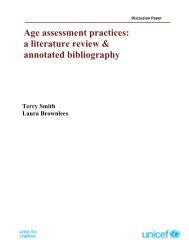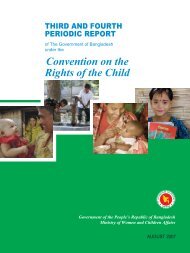Government-funded programmes and services for vulnerable - Unicef
Government-funded programmes and services for vulnerable - Unicef
Government-funded programmes and services for vulnerable - Unicef
Create successful ePaper yourself
Turn your PDF publications into a flip-book with our unique Google optimized e-Paper software.
<strong>Government</strong>-<strong>funded</strong> <strong>programmes</strong> <strong>and</strong> <strong>services</strong> <strong>for</strong> <strong>vulnerable</strong> children in SA<br />
Key legislation<br />
● Social Services Professions Act, No. 110 of 1978<br />
● Social Assistance Act, No. 59 of 1992<br />
● Welfare Law Amendment Act, No. 106 of 1997<br />
● Social Assistance Act, No. 13 of 2004<br />
●<br />
Children’s Act, No. 38 of 2005 as amended by Act No. 41 of 2007 <strong>and</strong> the Child<br />
Justice Act, No. 75 of 2008 (‘the Children’s Act’)<br />
● Social Assistance Amendment Act, No. 6 of 2008<br />
● South African Social Security Agency Act, No. 9 of 2004<br />
● Prevention of <strong>and</strong> Treatment <strong>for</strong> Substance Abuse Act, No. 70 of 2008<br />
Programmes <strong>and</strong> <strong>services</strong> provided<br />
The <strong>programmes</strong> <strong>and</strong> <strong>services</strong> provided by the DoSD to realise <strong>and</strong> protect the rights<br />
of children <strong>and</strong> their families fall into three categories: 23 comprehensive social security,<br />
developmental social welfare <strong>services</strong>, <strong>and</strong> community development <strong>services</strong>.<br />
Comprehensive social security<br />
The right to social security is protected internationally, regionally <strong>and</strong> nationally. The<br />
UNCRC specifically obliges ‘State Parties [to] recognize <strong>for</strong> every child the right to benefit<br />
from social security, including social insurance, <strong>and</strong> [to] take the necessary measures to<br />
achieve the full realization of this right’ (Article 26(1)). The ACRWC in turn obliges State<br />
Parties to ‘assist parents <strong>and</strong> other persons responsible <strong>for</strong> the child <strong>and</strong> in case of need<br />
provide material assistance <strong>and</strong> support <strong>programmes</strong>’ (Article 20(2)). At a national level,<br />
the South African Constitution guarantees that ‘everyone has the right to have access to<br />
social security, including, if they are unable to support themselves <strong>and</strong> their dependents,<br />
appropriate social assistance’ (section 27(1)(c)).<br />
Social security includes both social assistance (non-contributory schemes) <strong>and</strong> social<br />
insurance (contributory schemes). 24 Social security is aimed at:<br />
● supporting adults whose earning power has permanently ceased, been interrupted,<br />
never developed, or is being exercised only at unacceptable social cost <strong>and</strong> such a<br />
person is in consequence not able to avoid poverty;<br />
● supporting children in need of maintenance. 25 The obligation to provide social<br />
security <strong>for</strong> children in need of maintenance applies, in the first instance, to children<br />
who are removed from their family setting. However, it is not limited to this scenario.<br />
There is also an obligation on government to provide social security to children<br />
whose parents are unable to provide their children’s rights. 26<br />
23 The author has organised the <strong>programmes</strong> <strong>and</strong> <strong>services</strong> offered in the programmatic order provided by the<br />
Department’s 2010–2015 Strategic Plan (DoSD 2010).<br />
24 Social security is defined in the White Paper <strong>for</strong> Social Welfare in South Africa (1997) as ‘a wide range of public <strong>and</strong><br />
private measures that provide cash or in-kind benefits, or both, first in the event of an individual’s earning power<br />
permanently ceasing, being interrupted, never developing, or being exercised only at unacceptable social cost <strong>and</strong><br />
such person being unable to avoid poverty. And secondly, to maintain children…It includes both social assistance<br />
<strong>and</strong> social insurance (contributory schemes)’.<br />
25 White Paper <strong>for</strong> Social Welfare in South Africa, 1997<br />
26 In both the Grootboom (<strong>Government</strong> of the Republic of South Africa <strong>and</strong> others v Grootboom <strong>and</strong> Others 2001 (1), SA<br />
46 (CC) 2000 (11) BCLR 1169 (CC)) <strong>and</strong> the TAC (Minister of Health & Others v Treatment Action Campaign <strong>and</strong> Others<br />
2002 (5) SA 721 (CC) 2002 (10) BCLR 1033 (CC)) cases, the courts decided that parents carry the primary responsibility <strong>for</strong><br />
providing children’s socio-economic rights. Where children are removed from the family setting, then the state is the primary<br />
duty bearer <strong>and</strong> must provide the child’s socio-economic rights provided <strong>for</strong> in sections 27 <strong>and</strong> 28 of the Constitution. This<br />
does not mean that the state has no obligation to a child living with his or her family. While parents are the main providers,<br />
if the parents are unable to provide their children’s rights, the state must ensure that the rights are protected.<br />
20
















